Sunday Feb 15, 2026
Sunday Feb 15, 2026
Thursday, 18 July 2024 02:10 - - {{hitsCtrl.values.hits}}
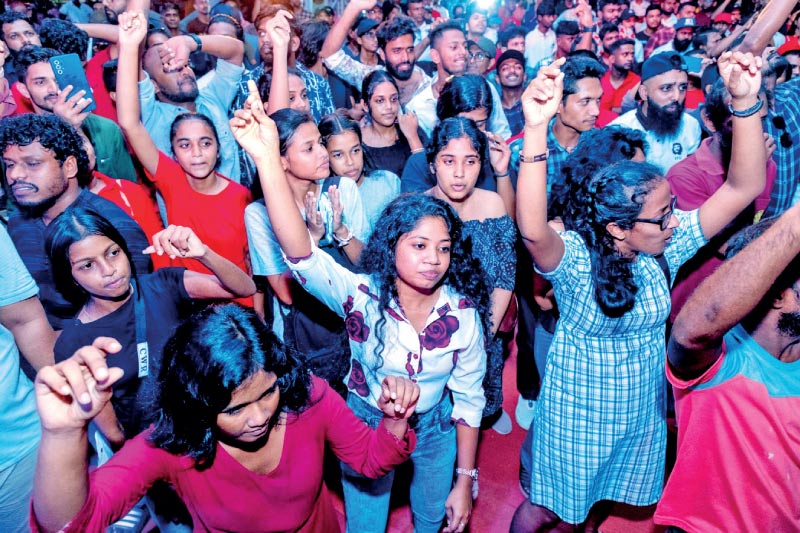
NPP Youth, Gampaha
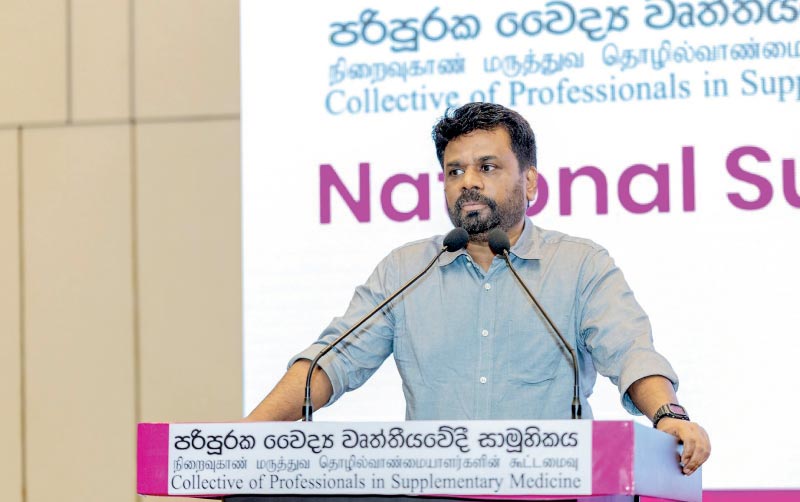
Addressing every professional sector
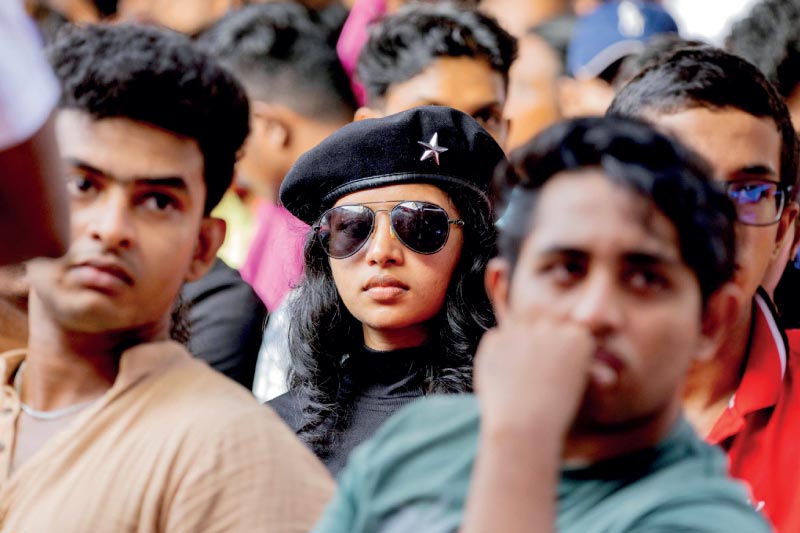
NPP Youth, Gampaha
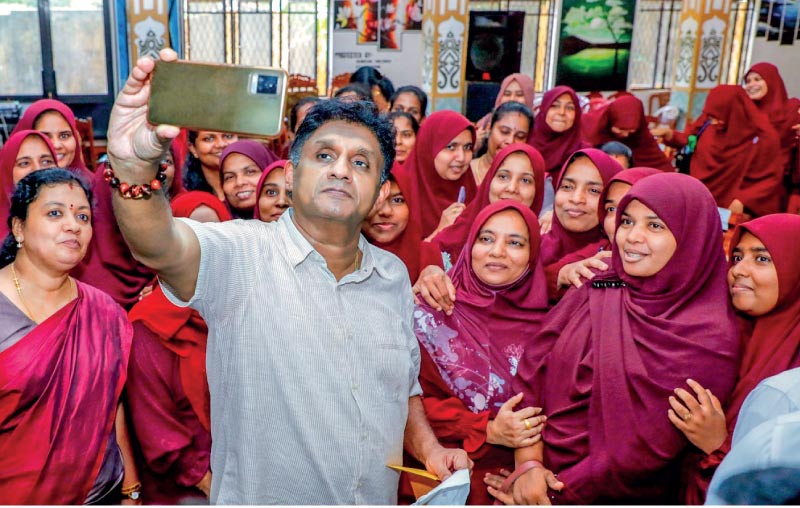
The Learning Revolution
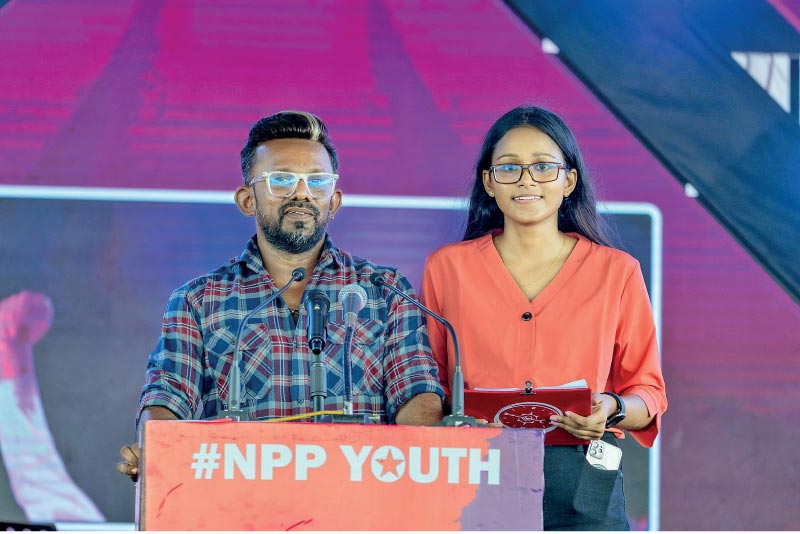
NPP Youth rally
 Early in his presidency or rather, the balance of Gotabaya Rajapaksa’s presidential term, to complete which he was selected by the Rajapaksas and elected by the vote of the discredited ruling SLPP, Ranil Wickremesinghe chaired a conference at the Presidential Secretariat. He said “we can talk about holding elections after fulfilling the agreement with the IMF, completing the debt restructuring efforts and placing the economy firmly on a high-growth path”. This wasn’t at a secret conclave of plotters planning to subvert the Constitution. It was on TV news.
Early in his presidency or rather, the balance of Gotabaya Rajapaksa’s presidential term, to complete which he was selected by the Rajapaksas and elected by the vote of the discredited ruling SLPP, Ranil Wickremesinghe chaired a conference at the Presidential Secretariat. He said “we can talk about holding elections after fulfilling the agreement with the IMF, completing the debt restructuring efforts and placing the economy firmly on a high-growth path”. This wasn’t at a secret conclave of plotters planning to subvert the Constitution. It was on TV news.
Just recently, in Mahiyangana, Ranil contributed to political theory by proclaiming outrageously: “I have said earlier that judicial power doesn’t rest with the judiciary; judicial power rests with the legislature…so that ends there.”
Weeks ago, at the Matara mass meeting organised by SLPP Minister Kanchana Wijesekara, Wickremesinghe returned to his theme that the Parliament is superior to the Supreme Court, saying “we can all get together in Parliament and decide on the Presidential and Parliamentary election”.
Immediately after Matara, the hero of the Aragalaya, former student leader Wasantha Mudalige who is still too young by several years to run for President, led a delegation to the Elections Commission to caution about the efforts by the executive to undermine the scheduled Presidential election.
The diplomatic community, the capitals of the established multi-party democracies, the international financial institutions and Colombo’s corporate community would have given an unambiguous signal that the constitutional time-table must be rigidly adhered to, not least because the backlash that would result from further filibustering would wreck all possibilities of economic stability, let alone return to growth.
Going by Ranil’s discourse, I half-expect an attempt at a presidential ‘autogolpe’ (‘self-coup’) rather than a gracious transfer of power in the highly probable event of electoral defeat.
|
My book on Fidel Castro’s politics
|
Wickremesinghe: All wiles, no wisdom
Anura Dissanayake was only half-right when he told parliament that “I pity those who believe Ranil is a cunning strategist. He’s neither cunning nor capable of setting traps…” AKD was wrong when saying “He’s neither cunning nor capable of setting traps…” Ranil is perfectly capable of both. Ranil is “cunning”. He’s just not “a strategist”.
Wickremesinghe’s transparent ambiguity about and conspicuous lack of commitment to the holding of the Presidential election on schedule hasn’t helped his public standing.
If Ranil was a strategist, he would not, at one and the same time, beckon the SJB to join him on the basis of a shared economic ideology, while repeatedly insulting Sajith Premadasa as “a coward who cut and ran” in 2022 when offered the PM’s post by Gotabaya Rajapaksa.
Ranil Wickremesinghe not merely “cut and ran”, but “crocodile-crawled” to Velupillai Prabhakaran, signing a wildly lopsided Ceasefire Agreement while refusing to give President Kumaratunga 24 hrs to study the text, and ordering the cancellation of a surgical strike on Prabhakaran scheduled for December 21st 2001 by a Special Forces Long Range Reconnaissance Patrol (LRRP) team hiding in ambush.
This treachery was chronicled by Prof Paul Moorcraft, senior instructor at Sandhurst, in his book on the destruction of the LTTE. It was a decapitation strike which could have driven the Tigers to a negotiated settlement, shortened the war, saved tens of thousands of lives, and revived the economy. For Ranil Wickremesinghe to call Sajith Premadasa and Anura Dissanayake “cowards” is hilarious hypocrisy.
Ranil being cunning but confused is trying to juggle three contradictory things: (a) draw-in the SJB en bloc (b) split the SJB (c) oust Sajith as leader. Ranil is unclear about his goal: convergence through partnership with the SJB or reunification of the UNP under his leadership.
His appeal to the row of Rajapaksas at the 27th (27th?) anniversary of the entry of the SLPP’s rollicking Rohitha “Raththaran” Abeygunawardena into politics, resembled a schoolboy’s address when auditioning before a panel. Ranil’s pitch worked tactically in that he immediately earned Basil Rajapaksa’s reciprocal endorsement. Strategically though, it probably eliminated any chances of the SJB partnering him in an alliance.
Basil controls the SLPP machine but cannot resurrect and deliver the SLPP votes to a Ranil hell-bent on ultra-UNP economic policies of a fire-sale of Sri Lanka to foreigners. If BR tries, the remaining SLPP votes will shift to AKD. If Ranil wins with SLPP support, the Pohottuwa will be replaced by a new hybrid formation under his leadership with the UNP at its core. Ranil’s successor will be a UNPer.
Economic Liberals’ illogic
The Colombo elite’s mood corresponds to behaviour defined in specialised literature as the ‘approach avoidance syndrome’. The desperate effort to dodge the perceived bullet of an elected JVP-NPP presidency has resulted in suggestions that are downright ridiculous. One analysis absurdly likens the JVP-NPP not to France’s leftist Popular Front but to the Far-Right, and urged a ‘republican convergence’ as sought by Macron against the populist ultranationalists. Even more convoluted, the recommendation was that the UNP and SJB should unite against the alleged Le Pen lookalike AKD-JVP-NPP, under the leadership of Ranil Wickremesinghe, with a possibility that Sajith Premadasa ‘could even’ become his Prime Minister.
Why should Sajith Premadasa, an elected MP leading a parliamentary group of significant size, and one of the two front-runners in public opinion polls which have Ranil lagging behind on third and his UNP a poorer fourth, play second fiddle in any centre-right ‘economic liberal’ dream ticket? The only reason adduced is Ranil’s economic crisis-management. Ahilan Kadirgamar’s recent exposé vaporises that argument. (https://www.dailymirror.lk/opinion/IMF-and-the-Great-Bond-Restructuring-Sell-Out/231-287216)
Even if one were to view Ranil’s economic performance charitably – ignoring culpability for the debt-crisis through his humongous ISB debt of 2015-2019--it should only earn him an emeritus consultative spot in a Sajith administration.
Presidential race and political science
On any given day Anura or Sajith noses ahead. Because of his more cohesive organisation (JVP) with its ideologically integrated collective leadership and better grassroots-network, and its political movement (NPP) which maintains a cracking pace and has caught the public imagination with its professional and social-sectoral conclaves, Anura probably leads by several percentage points.
That’s mutable. Sajith continues his molecular accumulation of allies and symbolises a mix of continuity and change. Anura offers only change while denouncing the entire post-Independence governance record. Which will the citizens prefer in October?
If a sufficient degree of “reasonable doubt” sticks to AKD-JVP-NPP, sourced in an unsatisfactorily addressed destructive past and apprehensions about the present -- “can they handle the economy? Who is the shadow Finance Minister?” --the needle of public preference could finally rest at Sajith-SJB.
I’m essentially a political scientist. It is not only because I have studied, taught and published internationally in that field that I feel impelled to apply and impart it in print. It is also because the classics of the subject itself are perspectival and pedagogical, arising within a concrete conjuncture and allied to a strategic project.
Plato’s ‘Republic’ is the product of a thinker of genius shocked by the execution of Socrates by Athens and wrestling with the weaknesses of Athenian democracy defeated by Sparta. His solution was to design a state and society which synthesised the virtues of both Athens and Sparta in a new ‘ideal form’.
Machiavelli’s ‘The Prince’ was the outcome of wrestling, under conditions of personal defeat, with his overarching concern: the unification of Italy into a state, overcoming its condition of a collocation of warring principalities. Rousseau was among the first to decipher Machiavelli as not writing primarily to advise a ‘prince’ but striving under that acceptable guise, to educate the masses on the founding of a republic. He was followed in this positive ‘reading’ of Machiavelli by Gramsci and Althusser.
Centuries later, Machiavelli’s compatriot Antonio Gramsci developed Marxist political science into a monumental contribution to political theory and political science in general, with his Prison Notebooks, written in the worst possible conditions of political defeat, incarceration in a fascist prison and acute illness. He named one of his most important essays ‘The Modern Prince’ as a salute to Machiavelli and a completion of his theoretical and strategic task, in the service not of the rising bourgeoisie though, but of an enlightened proletariat.
As a political scientist I feel duty-bound to make a constructive critique of Anura Dissanayake and his JVP-NPP just as of Sajith Premadasa and his SJB, so that these two young politicians can channel their very best selves to competitively trigger a generational tectonic shift in the island’s political leadership.
AKD’s dilemma
One of Anura’s great strengths is his interlocking dual-component model or hybrid formation, the JVP-NPP. I recognise its great precursor in contemporary political history as Fidel Castro’s July 26th Movement, a broad radical democratic movement named after the date of the Moncada uprising of July 1953, the abortive, Spartacus-like storming of the Moncada military barracks led by Fidel and Raul Castro.
I might mention that I am author of a book on Fidel Castro’s theory and strategy, published in the UK and US and reviewed in scholarly publications as diverse as the Royal Institute of International Affairs (Chatham House) journal and Radical Philosophy. (https://www.waterstones.com/book/fidels-ethics-of-violence/dayan-jayatilleka/9780745326962)
It is Fidel’s politico-ethical discourse contained in his address to the courts and published clandestinely and circulated to the country as ‘History Will Absolve Me’ that turned a military defeat into a moral, and thereafter a political, and finally a military victory. The publication and dissemination were done by his clandestine political support network re-branded the July 26th Movement.
Fidel and Raul returned to the shores of Cuba in December 1956 on the leaky yacht Granma with Dr. Ernesto ‘Che’ Guevara with them, totalling a force of 81 men, which survived deadly ambushes including aerial bombing, to reconstitute itself as a guerrilla force, the Rebel Army. Its support network was the July 26th Movement (J26M).
The Rebel Army was the ‘politico-military vanguard’, ‘the small motor’ (to use Regis Debray’s phraseology) that drove the ‘large motor’ of the July 26th Movement. Today’s JVP is by no stretch of the imagination a guerrilla ‘Rebel Army’ or ‘politico-military vanguard’, but it is the political vanguard, the ‘small motor’ that drives the ‘large motor’ of the semi-autonomous political movement, the NPP.
Fidel Castro’s J26M was an innovation of genius, but it was not meant for electoral competition. Indeed, Fidel revised it even in his advice on revolutionary warfare for guerrilla movements in subsequent decades. More relevant, he urged a different model on left movements engaged in electoral composition. In both these post-J26M models, Fidel Castro drew heavily on the communist theory and strategy of United Fronts and Latin America’s Gramscian innovation of the Popular Bloc. “People” and “Unity” were his watchwords.
Anura Dissanayake’s JVP-NPP faces a strategic dilemma:
1. It is modelled on a brilliant innovation in its time, the July 26th Movement, purpose-built for a specific strategic form of struggle, revolutionary people’s war. (When the JVP was engaged approximately in that type of struggle in the 1980s, it did not use this model, but a vicious caricature, the DJV).
2. The JVP-NPP binary format is not the organisational model recommended by Fidel Castro for popular movements and struggles aimed at the electoral victory of the Left, which provided the template for the successive Pink Tide electoral victories in Latin America.
Anura has to accomplish with an older, rudimentary (J26M) model built for the less complex terrain and task of overthrowing a dictatorship (Batista), the ramified role and functions undertaken by a more advanced model (‘Pink Tide’) designed for a more complex competitive environment (multi-party democracy) and capable of a broader social range and higher reach.
The J26M model was necessarily clandestine, selective and bounded. The newer ‘Pink Tide’ model which involved many former armed revolutionary vanguards of the 1960s, 1970s and 1980s, represented evolution to a far more open, transparent, democratic model. The JVP-NPP has yet to achieve that level of openness, transparency, flexibility and manoeuvrability. Hence the failed negotiation with the Dullas-Charitha faction.
Several weeks ago, the JVP-NPP held a “Student Heroes Commemoration” to honour JVP student youth who died in two uprisings, particularly the second one in the 1980s. Such practices are no longer undertaken by most ex-guerrilla leaders and armies of Latin America elected/re-elected to office or aspiring to be. Memorialisation of martyred militants is left to non-party ‘civil’ practices: memoirs, histories, literature, cinema; the arts and culture. The reason is that civil wars always trigger bitter, conflicting social memories, while constructing electoral majorities for political victory require their transcendence.
Anura and the JVP-NPP must decide whether they want to win the election(s) or to fall between two stools by juggling different politico-existential identities/mentalities.
Avoidable, rectifiable errors
The JVP-NPP equates ‘experience’ with ‘membership of the corrupt political establishment’. It is big on political purity but short on experience and expertise derived from practice.
At the impressive Dambulla (July 13th) and Gampaha Youth (July 14th) meetings, AKD displayed delighted scorn at Dullas Alahapperuma’s faction aligning with Sajith’s SJB because this supposedly ‘proved’ that everyone apart from the JVP-NPP is indistinguishably, interchangeably, identical and the NPP’s ducks are now lined-up in a row.
Ignoring inter-capitalist and intra-establishment contradictions, the JVP-NPP apparently thinks that driving vacillatory intermediate political elements away instead of winning them over, is correct strategy. Lenin acerbically remarked somewhere that “some comrades think minus three is greater than minus two”—meaning, they go by the larger figure and ignore the sign which denotes depletion, reduction, loss. Proliferation of foes enables enemy encirclement and is strategically dangerous.
AKD attempts to offset the JVP-NPP’s sectarian rejection of even dissident factions of current and former Governments, with appeals to his audiences to unite at grassroots-level irrespective of their earlier party-political affiliations. This is the tactic of the ‘United Front from below’ tried-out by the Communist International (Comintern) which promptly abandoned it due to its colossal failure, swiftly replacing it with the ‘United Front from above’ i.e., at leadership level.
While the JVP-NPP rejects the ‘united front from above’ which has proved successful for a century on several continents, its preferred practice the ‘united front from below’ has never succeeded anywhere.
Reset before elections
The three-paragraph call for “a People’s Assembly by lottery” in the text of an appeal to the NPP to unite the Left, by a civic group headed by an emeritus professor of political science and featuring another retired senior political science professor, sounds corny by my Leninist Realpolitik (Lukacs) standards. (https://srilankabrief.org/citizen-group-writes-to-npp-unite-the-left-against-neo-liberalism-and-provide-an-acceptable-solution-to-ethnic-issue/)
There is a stronger imperative for Left unity. The Aragalaya stalled after Gotabaya’s overthrow, culminating in the ultra-comprador Ranil regime. This was due to the strategic schism within the Aragalaya between the FSP-IUSF and the JVP-NPP.
Anura often projects the 2024 elections as battles to fulfil the aspirations of the 2022 Aragalaya by politically completing that struggle, crowning it with a ‘people’s power’ administration, but that can only be achieved by bridging the strategic schism through a united front encompassing both streams of the Left.
As Lenin reset the Bolsheviks in 1917, Anura should swiftly reset the JVP-NPP before the Presidential election, or switch to a United Left Front at least at the Parliamentary election.